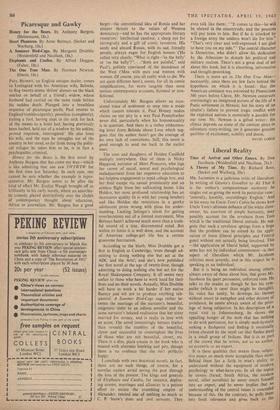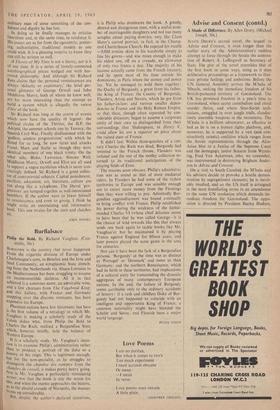Liberal Reality
Time of Arrival and Other Essays. By Dan Jacobson. (Weidenfeld and Nicolson, 21s.) A Theory of My Time. By Richard Rees.
(Seeker and Warburg, 30s.)
MR. JACOBSON is a judicious critic of liberalism. In writing of Graves's Goodbye to All That it is the author's compassionate authority he singles out as giving the work its particular tone: `centrally, knottily, unyieldingly English.' And in his essay on Uncle Tom's Cabin he shows how Uncle Tom's ultimate defiance of the white slave- owner, his assertion of simple humanity, may possibly account for the revulsion from Torn which is the traditional liberal attitude. He sug- gests that such a revulsion springs from a hope that the problem can be solved by the appli- cation of force (liberal principles and Federal guns) without our actually being involved. This —the application of liberal belief, supported by arms but not by individual commitment—is that aspect of liberalism which Mr. Jacobson criticises most severely, and in this respect he is speaking as an individual. But it is being an individual among others, always aware of those about him, that gives Mr. Jacobson his quiet persuasive, unforced tone. He talks to the reader as though he has his sym- pathy (which is rarer than might be thought); his voice has sanity, he develops his themes without resort to metaphor and other devices of avoidance, he seems always aware of the privi- lege of being subjective. In his description of a royal visit to Johannesburg, he shows the appalling hunger of the mob that has nothing to do with patriotism, but is simply mob-hysteria seeking a flashpoint and finding it eventuallY (when cheated by the royal car that flashes past) in a small group of Indians. But it is as part of the crowd that he writes, not as an author, an eccentric or an expert. It is these qualities that makes these subjec- tive essays so much more acceptable than most, Behind them lies a faith in man's abilitY to understand without the equipment of modern psychology or what-have-you. In all the topics he covers (Israel, South Africa, the modern novel, other novelists) he never erects himself into an expert, and he never implies that an understanding of the central issues is concealed because of this. On the contrary, he pulls them into fresh relevance and gives back to the
ordinary man of sense something of the con- fidence and dignity he has lost.
In doing so he finally manages to criticise liberalism and, at the same time, to reinforce it. His essays are as far from the egocentric, postur- ing, authoritative, traditional models as one could wish. it is a pleasing surprise to know they can still be written so well.
A Theory of My Time is not a theory, nor is it of our time. It is a series of loosely-connected autobiographical pieces wedged out with bor- rowed philosophy. And although Sir Richard Rees claims that the personal reminiscences are always 'didactic or cautionary,' the brief per- sonal glimpses of George Orwell and John Middleton Murry, both of whom he knew well, are far more interesting than the attempt to build a system which is allegedly the raison d'&re of the book.
Sir Richard was long at the centre of events which now have the quality of legend: the political circles of the Thirties, the ILP, the Ade1phi, the summer schools run by Tawney, the Spanish Civil War. Finally disillusioned with the `godless, aimless progressivism' with which he flirted for so long, he now turns and attacks Freud, Marx and Stalin as though they were identical members of one black trinity. On the other side, Blake, Lawrence, Simone Weil, Middleton Murry, Orwell and Eliot are all used to support a vague mysticism which is never con- vincingly defined. Sir Richard is a great collec- tor of controversial subjects. Capital punishment, Pacifism, education, art, literature, culture are run along like a xylophone. The liberal `pro- gressives' are lumped together as well-intentioned bumblers. If the author were to lower himself to reminiscence and even to gossip, I think he might write an entertaining and informative 1)430k. -I his one strains for the stars and clutches air.
JOHN DANIEL



































 Previous page
Previous page